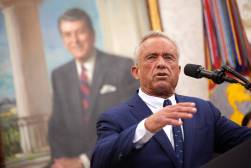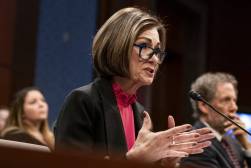Coronavirus data errors reveal ‘uncharted waters’ for states

A newly revealed glitch in Iowa’s coronavirus data platform was blamed this week for artificially lowering the state’s reported numbers of new infections and positive diagnostic test results. The error, which was reported Monday by the Associated Press, resulted in potentially thousands of recent COVID-19 cases being counted as having occurred several months ago, creating what one nurse called a “horrifying” effect on the state’s ability to safely reopen schools and other facilities.
Iowa officials told the AP that the counting error is being addressed. But the incident makes the Hawkeye State the latest state to have issues with how it collects and publishes data related to the pandemic, a trend that has the ongoing effect of undermining confidence in public health efforts and states’ ability to get the health crisis under control, a government data expert told StateScoop.
“When we don’t have trusted data around COVID, the real danger is we are making decisions on a regular basis about what businesses are open, what schools are open, and it is presumably being informed by the case data, and testing data and prevalence of disease,” said Beth Blauer, the executive director of the Johns Hopkins University Centers for Civic Impact. “If that data is flawed, you’re not making sound public policy decisions.”
Blauer, whose team helped build Johns Hopkins’ popular maps and data visualizations tracking the spread of the coronavirus, said the need for constant and accurate data caught states off guard when the pandemic arrived in the United States, a problem exacerbated by a shortage of sound technological governance.
“The biggest tension is there’s no leadership from the federal perspective on data standards,” she said. “Ordinarily this is something we’d lean on [the Centers for Disease Control] to help.”
‘Completely uncharted waters’
Data slip-ups at the state level are also mounting. California Public Health Director Sonia Angell resigned Aug. 9, just days after it was discovered that the electronic system by which the state was counting coronavirus tests had broken down, leading some local officials to count cases by hand and to issue warnings that publicly reported statistics were unreliable. Texas officials blamed coding errors and a software update last week when the hard-hit state’s tally of COVID-19 infections jumped suddenly by 124,693. Other states, Blauer said, have muddied their reporting by combining results from diagnostic tests, which report actual infections, with results from blood screenings for coronavirus antibodies.
In other states, political feuds have undermined confidence in tracking outbreaks. West Virginia’s top health officer quit June 24 after Gov. Jim Justice accused her of overstating the number of active infections. And in Florida, Gov. Ron DeSantis has openly feuded with Rebekah Jones, a former health department GIS manager who was fired in May after she claiming that she’d been pressured into altering data on the state’s COVID-19 data dashboard to build support for DeSantis’ plans to reopen the economy. (In the months since Jones’ ouster, Florida’s cumulative tally of coronavirus infections has jumped to more than 580,000, with nearly 9,800 deaths.)
An upshot of all these episodes, Blauer said, is that it becomes more difficult for local governments, businesses and individuals to know when it’s possible to reopen shuttered parts of society and relax or enhance measures like mask mandates and social-distancing requirements. It’s also thrust the need for accurate government data into an entirely new context, she said.
“It’s the first time in my lifetime where data’s really having this moment where it’s not just the policymakers who need information, it’s also individuals,” she said.
And without stronger standards at the top, she said, the United States may remain a nation of armchair epidemiologists.
“We’re in completely uncharted waters for public data,” she said. “We haven’t really invested not just capital that’s required but also the policy pieces of this. Individuals are driving their own personal behavior based on data that’s being shared.”
The federal government’s data-collection efforts were further scrambled last month when the CDC, the body to which hospitals normally report infectious disease data, was replaced with a new program run directly by the Department of Health and Human Services.
‘Drinking from a fire hose’
Despite stumbles like Iowa’s and California’s, Blauer said she’s seen some progress at the state level as the pandemic’s worn on, including regional data-sharing attempts and programs led by organizations like the National Governors Association and Results for America, which last week recognized seven states for how they’ve used data to inform their pandemic responses.
“I think a lot of this is drinking from a fire hose,” she said. “There needs to be a little bit more coordination. We’re going to be tracking this information for at least another year. We’re going to be adding in vaccination data and who’s getting it.”
But over the longer term, setting data governance standards that work across state lines — much less the entire country — will be vital to getting control of COVID-19, Blauer said.
“As we are looking at the policymaking, how will we ever learn from each other and scale best practices if there isn’t consistency in the way we measure not only around case data but around the policy implementation [like masks, tiered re-openings and contact tracing]?” she said. “We could save a lot of time and money if we learned from each other.”






